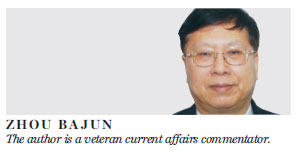Political reform reaches a crucial stage in Hong Kong
Updated: 2015-05-13 08:08
By Zhou Bajun(China Daily)
|
|||||||
On May 4, Zhang Xiaoming, director of the Central People's Government's Liaison Office in the Hong Kong SAR, published an article titled"Be confident in our political system when promoting universal suffrage with Hong Kong characteristics". Zhang emphasizes that the SAR government's proposal on the Chief Executive (CE) election by universal suffrage is based strictly on the Basic Law and the decision made by the Standing Committee of the National People's Congress (NPCSC) on Aug 31, 2014. He comprehensively elaborates on how the government proposals conform to Hong Kong's actual situation on key features. This includes constitutionality, democracy, legitimacy and stability.
From May 9 to 17, Alliance for Peace and Democracy, which consists of 1,000 member organizations all belonging to the "Love the Nation and Love Hong Kong" camp, is undertaking a citywide campaign to support the government's proposals. The campaign will establish 400 booths across the city on weekdays and 800 on weekends, gathering signatures from people aged 18 or above.
Zhang's article is encouraging patriotic commentators to explain the government's proposal theoretically. The massive signature petition is also trying to rally public support for the proposal. Both actions demonstrate that the central government and patriotic camp steadfastly support Hong Kong having "one person, one vote" in the CE election in 2017.
Hong Kong is now engaged in a decisive battle over electoral reform. This is crucial for both the patriotic and opposition camps in order to obtain the support of the so-called "middle mass". The SAR government has launched its publicity campaign following release of its electoral proposals. It uses the slogan "pocket it first".
The simple slogan "pocket it first" may win the support of some Hong Kong people. However, it is too simple and some doubt whether the government proposals will be good enough. Only by clearly illustrating that these proposals are the best ones for the HKSAR, can the patriots beat the opposition in the publicity campaign. Therefore, the patriotic camp should now combine a massive signature petition campaign with a new round of public opinion polls. This focuses on ideas which are crucial for encouraging the SAR's constitutional development. This will take place in the territory in the next one and a half months. The government and patriotic camp should unite strongly over this.
It should also be mentioned that not all political leaders may be aware of the significance of some of their comments. For example, on May 6, Executive Council member Fanny Law openly suggested that two lawmakers from the Civic Party - Ronny Tong and Dennis Kwok - could potentially become CE candidates if universal suffrage is implemented for the CE election in 2017. Tong and Kwok quickly rejected Law's suggestion. Secretary for Constitutional and Mainland Affairs Raymond Tam, who is Law's colleague, said naming anyone as a possible CE candidate at this early date is "unfair and does the system no good". Tam advised politicians to stop doing this.
Nevertheless, as the voting date in the Legislative Council (LegCo), in late June, draws nearer, society will focus on how many opposition lawmakers will vote for the government's proposal. Even though the signature campaign will put great pressure on the opposition, it will not be easy for the government to secure the support of at least four opposition lawmakers. If the government's proposal is vetoed in the LegCo by opposition lawmakers, local authorities should continue to explain its many advantages. These include constitutionality, democracy, legitimacy and stability.
The political battle has entered a decisive stage. Any concessions to the opposition should be ruled out. Hong Kong people should realize that the opposition camp is not only likely to impede the government's proposal, but will also hurt the Basic Law and the national Constitution. Only by steadfastly defending these can Hong Kong overcome any difficulties and obstacles on its path toward universal suffrage.
In future, any potential CE election by "one person, one vote" should be implemented strictly under the NPCSC's legal framework. The sooner more Hong Kong people understand this, the faster the city will see universal suffrage implemented. I staunchly believe it won't be disastrous for Hong Kong if the government's proposal is ultimately vetoed in the LegCo. Rather, it will usher in a new era for the HKSAR's constitutional development.

(China Daily 05/13/2015 page12)